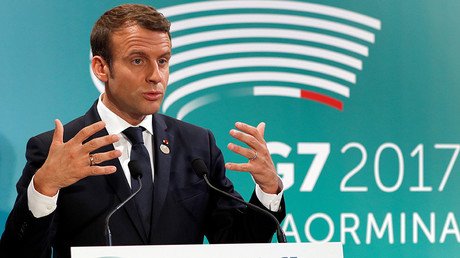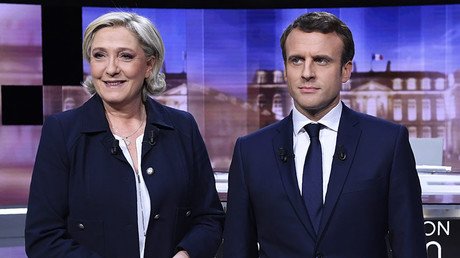Putin, Macron meet in Versailles on 300th anniversary of Tsar Peter’s visit to France
Russian President Vladimir Putin has arrived in France to meet new French leader Emmanuel Macron. Macron, who in the past has been critical of Moscow, is hosting Putin at the Chateau de Versailles, just outside Paris.
Macron invited Putin to participate in the inauguration of a major exhibition celebrating the 300th anniversary of Peter the Great’s diplomatic visit to France in 1717.
“I have respect for Russia, and I invite Vladimir Putin in the framework of a three hundred year diplomatic relationship,” Macron said this weekend.
Macron has also acknowledged the importance of dialogue with Russia in resolving certain international problems, such as Syria and Ukraine, which he plans to discuss during his meeting with Putin.
“Many international problems cannot be resolved without Russia,” Macron said at a news conference after the two-day meeting of G7 leaders in Sicily, which wrapped up Saturday.
The new French leader emphasized that he was planning to have “a demanding dialogue with him [Putin] and I will discuss all the problems.”
Putin’s visit will also afford an opportunity for the two leaders to “discuss the state and the prospects of development of Russo-French relations in political, trade, economic, cultural and humanitarian spheres,” the Kremlin said in a statement.
“The presidents will discuss the state of political contacts, which do not satisfy the Russian side,” Kremlin aide Yuri Ushakov added on Friday.
Answering questions from journalists, Kremlin spokesman Dmitry Peskov said that the issue of fighting terrorism will be the main focus of Putin and Macron’s meeting.
The subject of combatting terrorism will occupy “a very important [place], it is an integral part of the negotiations,” he added.
It remains to be seen, however, if the new French president manages to build a constructive relationship with the Russian leader, as over the course of his campaign, Macron pledged to deal firmly with Moscow.
Macron was emphatic that he wouldn’t support lifting sanctions against Russia until it meets its “obligations” in Ukraine. However, and at the same time, the 39-year-old politician called for a “de-escalation” of the sanctions which he said has had a negative impact on bilateral trade.
Speaking on Syria during the campaign trail, Macron underlined that it was a mistake to make President Bashar Assad’s departure a precondition for negotiations, advocating instead for a diplomatic solution to resolve the Syrian crisis. However, after the April 4 chemical attack in Syria was pinned on Damascus, Macron said Assad would have to “answer for his crimes before international tribunals.”
Putin’s previous visit to the French capital in October 2016 was canceled when his former counterpart, Francois Hollande, voiced “reluctance” to meet after Moscow blocked Paris’ UN proposal of a no-fly zone over Aleppo, Syria.
Officially, however, Moscow canceled the visit due to Paris’ rescheduling of some “cultural events” that Putin was particularly interested in attending.
Macron’s meeting with the Russian president comes amid a challenging time in bilateral relations between Paris and Moscow.
At the height of his election campaign against far-right candidate Marine Le Pen, Macron’s team rejected the accreditation of Russian news agencies and accused RT and Sputnik of spreading fake news. Yet no real evidence backing the assumption of any bias has been provided to the public or the news outlets accused.
Less than 48 hours before the second round of French Presidential election on May 7, Macron found himself a victim of a “massive and coordinated hacking operation.” Macron’s campaign repeatedly complained about attempts to hack their emails, citing alleged Russian interests in the cyberattacks.
Macron has also accused Moscow of pursuing a “hybrid strategy, combining military intimidation and an information war.” Russia has repeatedly and firmly denied the allegations.
Yet, despite a somewhat confrontational stance towards Moscow, Putin was among the first world leaders to congratulate Macron on his presidential win. In a phone call just after his election, Putin urged Macron to “overcome the mutual distrust” between Russia and France and to “join forces to ensure international stability and security.”














